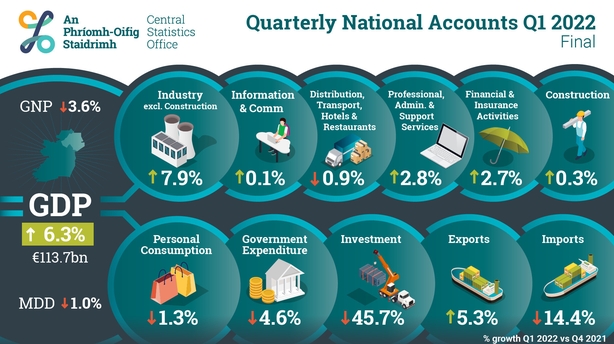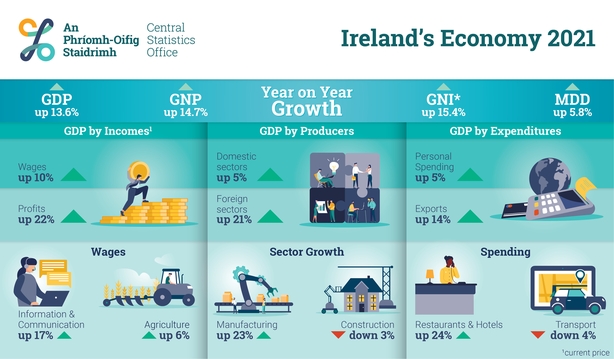The Central Statistics Office has revised downwards the level of economic growth recorded in Ireland during the first quarter of this year.
Publishing the finalised quarterly national accounts for the period between January and March, the CSO said Gross Domestic Product (GDP) rose 6.3% during the period, down from the 10.8% it reported in the preliminary data in June.
Gross National Product (GNP) contracted by 3.6% over the same timeframe, it said, compared to the 0.4% it reported last month.
The CSO said much of the change arose from modifications to the carried over economic base from 2021, after revisions were made to those full-year results, caused predominantly by the effects of multinational companies here.
When those effects are stripped out, the final figure for Modified Domestic Demand (a measure of personal, government and investment spending) for the first quarter is unchanged, with domestic consumption still recorded as contracting by 1% over the three months.
"While disruptions in the global supply chain and rising cost pressures continue to impact this year, the strong performance of the Irish economy will act as a buffer in the face of these challenges," said Ibec economist, Hazel Ahern-Flynn.
Downward revisions were made to the performance of a number of sectors, including industry, which grew 7.9% during the quarter, ICT which expanded by just 0.1%, and professional, administration and support services which grew 2.8%.
Distribution, transport, hotels and restaurants which had been estimated to have grown by 11.9% in the provisional results was revised down to a contraction of 0.9%.

Contrary to the preliminary data last month which found it had shrunk, the construction sector was found to have grown marginally by 0.3%.
Arts, entertainment and other services contracted by 9.8%.
"Today's release underscores the challenges our economy faces," said Minister for Finance Paschal Donohoe.
"Momentum in the domestic economy and that of our trading partners is slowing and inflationary pressures are mounting," Mr Donohoe said.
"The Government has worked proactively to tackle these challenges and Budget 2023 will be a 'Cost of Living Budget’ which builds on the €2.4 billion in cost-of-living measures announced to date," he said.
"In doing so we must ensure that budgetary measures strike the right balance. It is neither affordable nor appropriate to absorb all of the price shock," he added.
Meanwhile, the revised Annual National Accounts for 2021 showed no major change in GDP growth, which came in at 13.6%, compared to 13.5% in the March estimate.
However, the CSO revised its calculation for GNP for the year upwards from the original estimate of 11.5% to 14.7%.
Modified domestic demand, which measures domestic performance, was revised down to 5.8% from the original estimate of 6.5% published in March.

GNI*, which is often considered a better measure of the underlying performance of the Irish economy because it strips out certain distorting effects like intellectual property and aircraft leasing, came in at 15.4%.
Multinational-dominated sectors grew by 20.7% in 2021 with all other sectors increasing by 4.8%.
Exports grew by 14.1% while lower imports of intellectual property products drove a decrease of 8.3% in overall imports.
Personal consumption, considered a key measure of domestic economic activity, increased by 4.6% in the year, as Covid-19 restrictions eased and spending resumed.
"The easing of Covid-19 related restrictions led to higher levels of economic activity in 2021 for many of the sectors focused on the domestic market," said the CSO's Assistant Director General with responsibility for Economic Statistics, Jennifer Banim.
"Finance & Insurance increased by 17.8% in the year, Real Estate activities by 6.6% while the Distribution, Transport, Hotels & Restaurants sector increased by 3.8%."
"However, the Construction sector contracted by 3.1%. Growth in the globalised Industry (excluding Construction) sector expanded by 21.4% in 2021 compared with 2020 while the Information & Communication sector increased by 16.1% in the year."
The finalised 2021 accounts include newly available data sets, updates to international trade in goods and international accounts, as well as commodity flow estimates.
"As I have said for a number of years now, GDP is not an accurate measure of what's going on in the Irish economy, and this view has been re-enforced by today’s numbers," Paschal Donohoe said.
"I place a much greater emphasis on measures such as modified domestic demand, which better reflects the underlying domestic economic activity."
"Modified domestic demand rebounded strongly last year with growth of 5.8 per cent for the year a whole. The strong rebound in activity is reflective of the resilience of the Irish economy in the face of adversity."

Stephen Kinsella, Professor of Economics at University of Limerick has said that while multi-nationals in Ireland are performing exceptionally well and contributing significantly to public finances, the domestic economy is showing signs of weakening.
"The statistics show that there are essentially two economies in Ireland. There’s the multi-national economy and there is everyone else," Professor Kinsella told News at One.
"The multi-national economy is delivering a huge amount of corporation tax revenue which is what will power one off spending to combat inflation in the upcoming budget.
"The perhaps more concerning element is the domestic economy. Many of the figures show that the domestic economy is actually weakening.
"If you compare construction activity in 2019 and construction activity in 2021 there’s less money being spent. Also, consumer spending is down despite the fact that restrictions are gone and jobs are open," he added.
We need your consent to load this rte-player contentWe use rte-player to manage extra content that can set cookies on your device and collect data about your activity. Please review their details and accept them to load the content.Manage Preferences
However, Professor Kinsella stressed the significance of the multi-national sector with respect to employment figures.
"There are 250,000 people in work via the multi-national sector and there are 2.4 million workers in this economy.
"The multi-national sector is delivering enormous benefits to the Irish economy particularly in terms of paying an enormous amount of all taxes. However, that represents a serious risk to the economy if one of these companies were to leave.
"Probably more importantly is the focus on the weakening sectors of the domestic economy that are being weakened by inflation. You can’t start construction projects at the moment because of the uncertainty around timber and steel.
"If that reduces what people expect the economy to do in the next year or two, people’s expectations about the future are determinative about what they do today".







